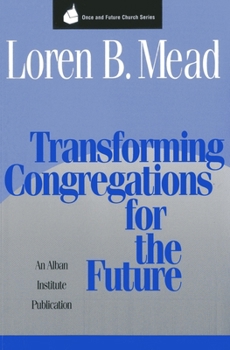Transforming Congregations for the Future
Select Format
Select Condition 
Book Overview
In this third volume of the Once and Future Church Series Loren Mead focuses on what he sees as the age-old call of the church - living and breathing the good news promise of spiritual transformation... This description may be from another edition of this product.
Format:Paperback
Language:English
ISBN:1566991269
ISBN13:9781566991261
Release Date:August 1994
Publisher:Rowman & Littlefield Publishers
Length:139 Pages
Customer Reviews
2 ratings
Valuable
Published by Thriftbooks.com User , 24 years ago
Now six years-old, Mead's insights into the church's sluggish and complacent stance in our fast-moving society are no longer new. However, the fact that they are still accurate, six years later, speaks to the quality of this resource. Most helpful, however, are Mead's more timeless insights into congregational psychology, conflict, and leadership. This is the type of book that, depending on your ministry situation, will mostly be extraneous, but then you will stumble upon 3 or 4 pages that will speak directly and helpfully to you. In my case, these pages were life-giving.What was helpful to me? On page 110, Mead shares 4 stages of organizations that surmount crises: shock, defensive retreat, acknowledgement, and growth and adaptation. He applies these stages to denominations and their relationships with postmodern culture, stating that most are somewhere just before or after the first stage (shock). Most helpful for me, though, was applying these stages to my congregation's recent history. I now have a much clearer understanding of why my congregation has responded as it has to my leadership approach.
The Bad News First
Published by Thriftbooks.com User , 24 years ago
According to Loren Mead, the Christian Church is in deeptrouble. The news is bad in many ways. Mainline churches facedeclining membership. Church attendance is down. The world in which we live is changing fast. Many people no longer find the church useful in their lives. The church needs to share the good news in fresh ways-ways that are meaningful to people during these uncertain times. The church should be about the business of transformation. Mead calls for a radically different understanding of mission, of evangelism, and of how individual congregational members are called to live it out.Not only congregations, but also religious governing bodies must mutate. This is a time of kairos-a time of unique danger and opportunity in the life of the church universal. Only God knows what the church of 2050 will look like. And so far ... God ain't talking.Picking up where he left off in book two of his Once and Future Church Series, Mead says the storm we are in is worse than we thought. And he has the statistics to prove it. The charts for church membership and membership as part of the population go in one direction-down. The members that remain are more generous. Denominational budgets lag behind inflation. Fewer and fewer congregations can match the magic number of $80,000 annually needed to employ a full-time seminary trained pastor as well as support building facilities, program, and outside giving. If the government decides to tax churches, that will have a direct impact on how churches do their work. The medical cost bomb is already going off. There may be other cost explosions we cannot foresee. This is not something we can generate a program to fix. A project to increase church membership will not work. Nor will a new improved stewardship program.Research shows the most important reason people drop out of church is not something the churches are doing or not doing; it is the character of the culture surrounding the congregations. What happens if the problem does not respond to program? That is the question raised by this research. Mead suggests we do not need a new set of programs. We need churches with a new consciousness of themselves and their task. Radical rethinking of our identity is fishy at best.These storms will not pass in our lifetime. That is the bad news.But the gospel is by definition good news. So Mead turns his attention to how Jesus proclaimed the good news. Jesus does not force or push his good news, but he never holds it back. Our congregations are called to be communities that follow Jesus in bringing good news to the pain of the world. END





